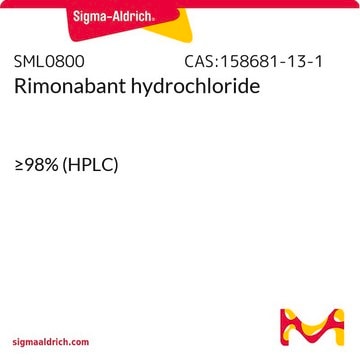M104
(±)-Muscarine chloride hydrate
≥98% (HPLC)
Synonym(s):
Tetrahydro-4-hydroxy-N,N,N,5-tetramethyl-2-furanmethanammonium chloride hydrate
About This Item
Recommended Products
Quality Level
Assay
≥98% (HPLC)
form
powder
storage condition
desiccated
color
white
solubility
deionized water: ≥20 mg/mL
storage temp.
room temp
SMILES string
[Cl-].CC1OC(CC1O)C[N+](C)(C)C
InChI
1S/C9H20NO2.ClH/c1-7-9(11)5-8(12-7)6-10(2,3)4;/h7-9,11H,5-6H2,1-4H3;1H/q+1;/p-1
InChI key
WUFRNEJYZWHXLC-UHFFFAOYSA-M
Gene Information
human ... CHRM1(1128) , CHRM2(1129) , CHRM3(1131) , CHRM4(1132) , CHRM5(1133)
Application
- as an acetylcholine receptor agonist in neuronal precursor cell lines PC 12 cells
- as toxin test compound for paper spray mass spectrometry (PSMS) optimization experiments
- as a component of quality control(QC) in hydrophilic interaction liquid chromatography-high resolution tandem mass spectrometry (HILIC-HRMS/MS) analysis of human urine samples
Biochem/physiol Actions
Features and Benefits
Signal Word
Warning
Hazard Statements
Precautionary Statements
Hazard Classifications
Acute Tox. 4 Oral - Eye Irrit. 2
Storage Class Code
11 - Combustible Solids
WGK
WGK 3
Flash Point(F)
Not applicable
Flash Point(C)
Not applicable
Personal Protective Equipment
Certificates of Analysis (COA)
Search for Certificates of Analysis (COA) by entering the products Lot/Batch Number. Lot and Batch Numbers can be found on a product’s label following the words ‘Lot’ or ‘Batch’.
Already Own This Product?
Find documentation for the products that you have recently purchased in the Document Library.
Customers Also Viewed
Our team of scientists has experience in all areas of research including Life Science, Material Science, Chemical Synthesis, Chromatography, Analytical and many others.
Contact Technical Service














